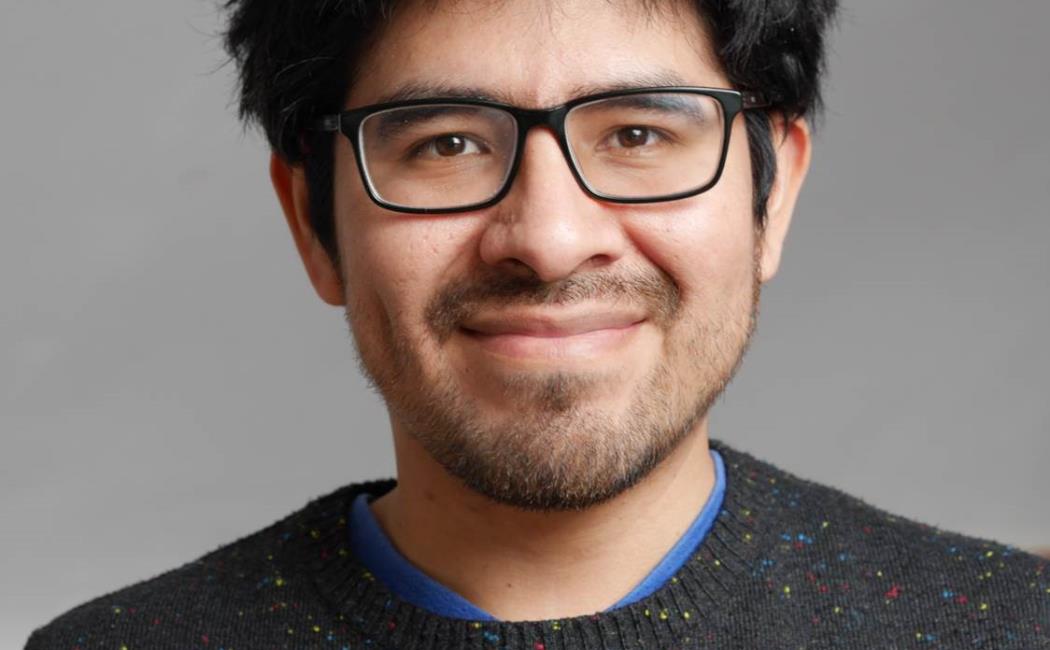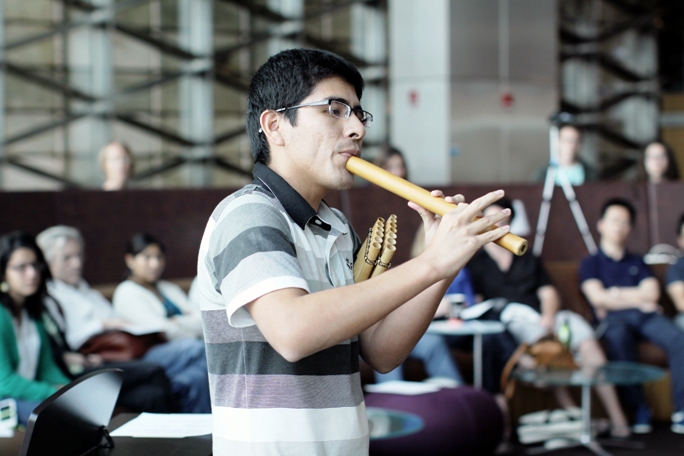


Alumni You Should Meet – Gustavo Quino (MS ’13) by Melissa Pappas (MS '17)
Studying in Saudi Arabia at KAUST was one of Gustavo Quino’s smartest decisions, and key to his academic career path. Quino, from Peru, is a research associate at the University of Bristol and draws on research experience fostered during his Mechanical Engineering masters at KAUST with advisor Professor Gilles Lubineau.
In addition to his professional growth at KAUST, Quino continued a passion for a particular instrument that he had learned to play in school - the Peruvian quena flute. Quino’s musical persona, QuinoQuena, took this skill to the stage at KAUST many times; and after KAUST, Quino aligned his passion for research and music through art-inspired science and science-inspired art.

Reflecting on choosing KAUST for graduate school he said, “I didn’t know that KAUST existed until I saw a poster at my university in Peru. It sparked my interest because I already knew that I wanted to travel to do research, but at the time I was focused on my plan to apply to schools in the US. A professor in Peru also recommended me to consider KAUST, while the only thing I knew from it was what I had seen in that poster.”
The world-class facilities, global faculty, housing and attractive photos of the campus helped Quino make up his mind.
“When I received the KAUST offer, I decided to not wait any longer on making a decision for grad school,” said Quino. “But my family and friends had very different opinions about me going to the Middle East to study.”
A common challenge that prospective international students face is the nervousness around the unfamiliarity of Saudi Arabia, but many find their experience at KAUST to be a journey into Middle Easter and many other cultures.
Quino’s journey to Saudi Arabia was a memorable one.
“While I had confidence in my decision to go to KAUST, leaving the country to start my masters would be the first time I had ever traveled internationally,” said Quino. “I didn’t even have a passport and no one in my family had been out of the country, so it was a stressful process obtaining all of the requirements for the visa to even set foot in the Kingdom.”
When Quino boarded his flight with his passport and visa in hand, he had another hurdle to overcome.
“When I finally got on the plane, the flight crew didn’t understand why I would be going to Saudi Arabia, so they questioned me and confiscated my passport for the duration of the flight,” said Quino. “Once I landed in Madrid, where I had a layover, my passport was handed to the local police who came to question me as well. When I told them I was going to Saudi Arabia to study, they were doubtful but let me continue my journey.”
Once Quino eventually landed in Jeddah, his move to KAUST went smoothly.
“Then, when I finally arrived to KAUST, I was exhausted but amazed that the scene around me matched the photos in the poster,” said Quino. “I honestly thought the photos were enhanced because of how beautiful they were. Then there was the student apartment, which to this day has been the best apartment I have lived in.”
Quino did not take too long to make friends, as KAUST’s orientation and campus experience create an environment for long-lasting relationships.
“KAUST was the first English-speaking environment I had lived in,” said Quino, “but I felt right at home because there was such a large Latin American community already.”
With good friendships established, Quino dove into his research.
“I started working in the Mechanics of Composites for Energy and Mobility Lab under Professor Gilles Lubineau on a project where I experimentally tested the durability of materials used in aerospace applications. Essentially, I was testing how the humid in-service conditions will affect the mechanical performance of aerospace components in the long-term. This type of testing is important for engineers to be able to design long-lasting and safe structures.”

Quino’s research in his masters inspired him to continue in academia. He applied to the University of Oxford for a PhD in impact phenomena and environmental ageing of composite materials for aerospace and marine applications.
“I was persistent when I was applying to PhD programs and although the professor I wanted to work with did not accept me to the original project I applied for, he offered me a different position that fit my skills much better,” said Quino. “I loved the work that I did in my PhD because our team was always working on something new and we always knew what the final industrial product would look like. I could imagine my research in the real-world, being part of an actual airplane, on the market in five to ten years, and some of what I worked on is already in use.”
The research that Quino has pursued in his academic career has led him to blend the line between art and science as he continues to play the quena.
“I started playing the quena when I was really young, and being at KAUST only improved my skills,” said Quino.
Eventually, Quino brought his passions together in a few different projects.
“Music found its way into my research as well,” said Quino. “While having coffee with an Oxford colleague working on mechanics of granular materials, I told him we could record the sound of grains of sand breaking to better understand how that material compresses and conforms under pressure. We conducted an entire novel experimental technique based on sound.”
“Later, I was invited to a music conference to show my work on digital manufacture of quena flutes, where I brought science to my music, using 3D printing and finite element analysis,” said Quino. “Now I actually own a quena made of carbon fiber reinforced polymer, the very same material I study in my research.”
Quino’s talent playing the quena will be highlighted at the KAUST Alumni Reunion on Saturday November 13. For those who cannot be present, Quino shares his music on his YouTube channel and website.
As Quino reflects on his time at KAUST and his path after graduation, he provides some advice for current and prospective students.
“You will need to set objectives to have a real and attainable goal in mind, but remember to also be open to different opportunities along the way. This is how I discovered KAUST and how I later discovered my PhD project at Oxford.”
Leave a Reply
Your email address will not be published. Required fields are marked *